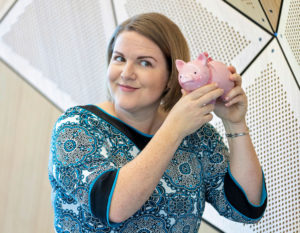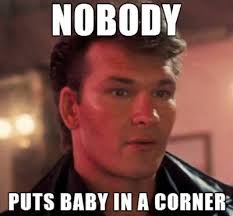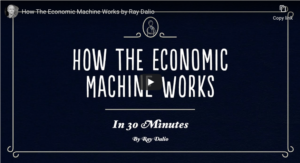When people ask: “Lacey, what should I do?” amid market turmoil like we’re seeing right now, I say:
“Grab your towel.”
No, I’m not suggesting a trip to the beach.
Fans of The Hitchhikers Guide to the Galaxy know the importance of having your towel with you at all times if you’re an interstellar traveller.
(Never read HHGTTG? You’re missing out. Check out this excerpt from the book by Douglas Adams on Goodreads to see why towels are critical.)
It’s become such a recognizable piece of folklore that there’s even a Towel Day, 25 May, when fans carry a towel as tribute to Adams and HHGTTG.
The towel represents security.
Physically, it’s a useful tool. It can be a blanket. It can provide warmth. It can be used to carry things. It can be a sunshade. Yes, you can also use it to dry yourself.
Adams also posits it’s useful for projecting an image of trustworthiness. That’s essential if you’re trying to get picked up as a hitchhiker. After all, a towel indicates care for basic hygiene, which I imagine is desirable inside a cozy spaceship.
There’s another psychological benefit.
The hitchhiker sleeps better knowing they’ve got a tool to use and a better chance of getting picked up. It’s a confidence booster, risk management tool and peace-of-mind-bringer all in one.
If you’re feeling even a modicum of stress about things beyond your control right now, I urge you to find your towel.
What might be stressing you out in early 2020?
The list is long:
- COVID-19 and the possibility of lockdowns and supply chain interruptions.
- A flood of oil supply dropping prices amid reduced demand.
- Potential for a recession or depression.
- Pre-selection for US elections.
- Potential for increasing government debt as they turn to stimulus.
- Recovery from the recent bushfires and floods.
…I could go on.
Over these current events lie long-term issues, such as a building sense of urgency about climate change and perhaps the need to redesign capitalism as we know it.
My blood pressure goes up just looking at that list. It’s why I prefer not to watch the nightly news.
Then I grab my towel, and I feel better.
What’s your towel during market turmoil?
My first boss, James Palmer, told me “worry is the absence of a plan.”
(JP tells me he’s since evolved this to: “concern without action is just worry – take action!” – which is a great way to express it.)
To keep at least a little peace of mind, you need to find yourself a metaphorical towel for survival and comfort.
I propose…
Your towel is your plan.
If you find yourself stressing about what’s happening, write out you plan for how you’ll respond in different possible scenarios.
For example, how will you respond:
- If we have the worst-case scenario: a full-scale depression, amid uncontained spread of COVID-19.
- If we have a moderate-case scenario: a prolonged recession and supply chain interruptions of two to four weeks while we get to grips with COVID-19?
- If we have the best-case scenario: this turns out to be an economic blip and COVID-19 is relatively well contained?
Hope for the best, plan for the worst
It can be terrifying to write out a plan that involves 25% unemployment, negative inflation and plummeting asset prices.
Given there aren’t many people alive who lived through the last time we experienced something like this in the 1930’s, it’s hard to picture what it’ll be like.
With any luck, it won’t happen. In which case, you won’t need the plan you’ve written.
But: far better to have it and not need it than the other way round.
If nothing else, it should give you some peace of mind that you know what you’ll do if the worst does happen. If does eventuate, you just put the plan into action. Much better than trying to create your plan under that kind of stress.
What might your towel include?
I’ll preface this with: none of us have a crystal ball for the future. We don’t know what will happen.
Further complicating things, we haven’t got a complete past model to compare with. The last depression was the 1930’s; Spanish influenza – a situation comparable not because COVID-19 is anything like the same, but because of the reach – was a decade earlier.
Both occurred 90+ years ago, so in not even remotely similar times with respect to medicine, technology and people movement.
No doubt someone will accurately predict what will happen, but we won’t know who got it right for (potentially) many years.
So, not knowing the outcome, what are some no-brainer things you can do?
1. Boost your buffer.
A buffer fund is a savings account in the bank earning interest. It’s your emergency fund, to get you through financial dry times.
You might want to make it a little bigger than you have in the past.
A bit of extra cash won’t go astray if mass unemployment comes to pass. Sure, if there’s a full-on depression it’s maybe not going to get you through a few years of unemployment.
But it will buy you time to put your plan into action without the IQ-decreasing mental stress you can expect with no buffer at all.

Probably not a bad time to boost those savings…
(Want more on buffer funds? See Chapter 1 in my book).
2. Take 30mins to watch this video.
Whether you agree with his approach or not, Ray Dalio’s animation titled ‘How the Economic Machine Works’ is an excellent overview of how our economy is structured.
After watching, you’ll probably get the implication: we’re due a depression-like correction.
He explains the four ways governments and banks can deal with them. After watching you’ll understand what ‘quantitative easing’ means, if you didn’t before.
3. Look after your mental health.
“Fear is the mind killer.” – Frank Herbert, Dune
Panic is contagious and looks a lot like stupidity. You could argue it’s both.
We know financial stress takes its toll on your intelligence, making you 13 IQ points dumber. When our amygdala, a.k.a. the crocodile brain, is in charge of our decisions, we risk making instinct-driven choices that aren’t serving us in the long run.
However, it’s a big ask to quell the fear pushing your amygdala into overdrive.
It’s been a rough year already, and many people have expressions of distracted worry on their faces right now.
Which is why we need to look after our personal mental health now, more than ever.
Whatever helps you feel better mentally: walks on the beach, meditation, writing in a journal, gratitude practice, exercise, coffee with a friend, singing in the shower, a good ol’ cry when Patrick Swayze says ‘Nobody puts Baby in a corner’ (…or is that just me?). Schedule more of it, now.
And do it!

Cue crying, bring the tissues (if we can find any on the shelves!)
What about buying/selling assets?
Last week, one friend told me he’s exited his position in his shares. Fully.
This morning, my husband was berating himself while making the kids’ lunches about not selling BHP shares when they were $40+ (they’re $27-ish this morning). “I meant to do it on the school holidays! But I got distracted…” he lamented as we walked out the door.
Part of me is rubbing my hands together gleefully as I look at the ASX, thinking ‘It’s a fire sale! Best be ready to grab a bargain…’
Another part of me is looking at my stockpile of cash like people are looking toilet paper right now.
But I can’t say a simple “yes” or “no” when people ask “Lacey, should I be buying or selling <shares/property/bonds/cryptocurrency/pink diamonds…>?”
My answer remains the same:
Do whatever helps you sleep well at night. Peace of mind is priceless.
There’s no one-size-fits-all for this stuff. You’ll need to decide what works best for you. Let me know if I can help.


